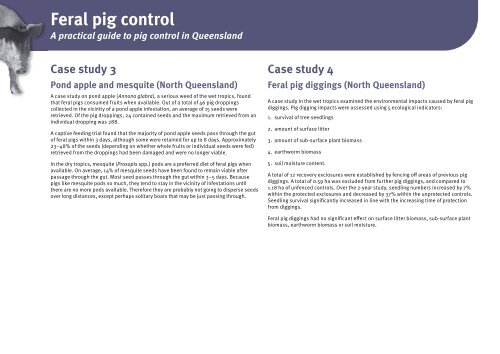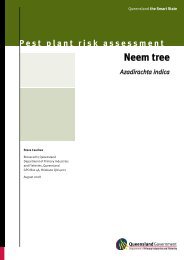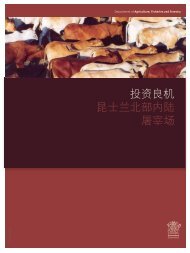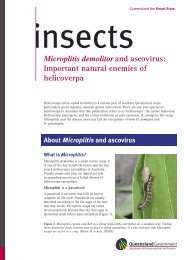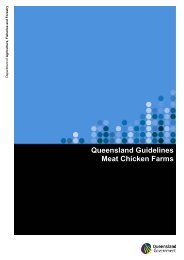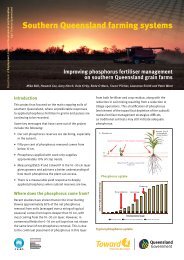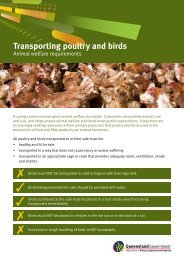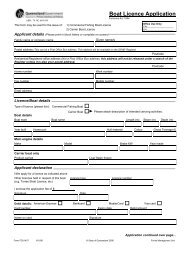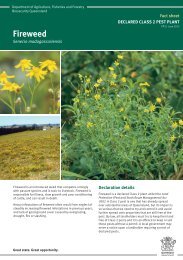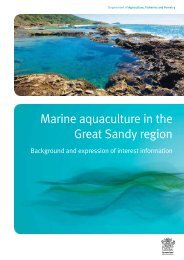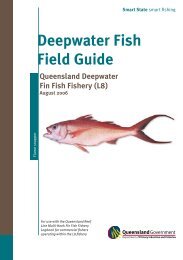Ipa Feral Pig Control Manual - Department of Primary Industries ...
Ipa Feral Pig Control Manual - Department of Primary Industries ...
Ipa Feral Pig Control Manual - Department of Primary Industries ...
Create successful ePaper yourself
Turn your PDF publications into a flip-book with our unique Google optimized e-Paper software.
<strong>Feral</strong> pig control<br />
A practical guide to pig control in Queensland<br />
Case study 3 Case study 4<br />
Pond apple and mesquite (North Queensland)<br />
A case study on pond apple (Annona glabra), a serious weed <strong>of</strong> the wet tropics, found<br />
that feral pigs consumed fruits when available. Out <strong>of</strong> a total <strong>of</strong> 46 pig droppings<br />
collected in the vicinity <strong>of</strong> a pond apple infestation, an average <strong>of</strong> 15 seeds were<br />
retrieved. Of the pig droppings, 24 contained seeds and the maximum retrieved from an<br />
individual dropping was 288.<br />
A captive feeding trial found that the majority <strong>of</strong> pond apple seeds pass through the gut<br />
<strong>of</strong> feral pigs within 3 days, although some were retained for up to 8 days. Approximately<br />
23–48% <strong>of</strong> the seeds (depending on whether whole fruits or individual seeds were fed)<br />
retrieved from the droppings had been damaged and were no longer viable.<br />
<strong>Feral</strong> pig diggings (North Queensland)<br />
A case study in the wet tropics examined the environmental impacts caused by feral pig<br />
diggings. <strong>Pig</strong> digging impacts were assessed using 5 ecological indicators:<br />
1. survival <strong>of</strong> tree seedlings<br />
2. amount <strong>of</strong> surface litter<br />
3. amount <strong>of</strong> sub-surface plant biomass<br />
4. earthworm biomass<br />
In the dry tropics, mesquite (Prosopis spp.) pods are a preferred diet <strong>of</strong> feral pigs when<br />
available. On average, 14% <strong>of</strong> mesquite seeds have been found to remain viable after<br />
passage through the gut. Most seed passes through the gut within 3–5 days. Because<br />
pigs like mesquite pods so much, they tend to stay in the vicinity <strong>of</strong> infestations until<br />
there are no more pods available. Therefore they are probably not going to disperse seeds<br />
over long distances, except perhaps solitary boars that may be just passing through.<br />
5. soil moisture content.<br />
A total <strong>of</strong> 12 recovery exclosures were established by fencing <strong>of</strong>f areas <strong>of</strong> previous pig<br />
diggings. A total <strong>of</strong> 0.59 ha was excluded from further pig diggings, and compared to<br />
1.18 ha <strong>of</strong> unfenced controls. Over the 2-year study, seedling numbers increased by 7%<br />
within the protected exclosures and decreased by 37% within the unprotected controls.<br />
Seedling survival significantly increased in line with the increasing time <strong>of</strong> protection<br />
from diggings.<br />
<strong>Feral</strong> pig diggings had no significant effect on surface litter biomass, sub-surface plant<br />
biomass, earthworm biomass or soil moisture.


